Key takeaways:
- Animal rights emphasize the moral and legal protections all living beings deserve, challenging traditional views that regard animals as resources for human use.
- Educational workshops foster awareness, empathy, and active participation in animal advocacy, enabling individuals to transform their understanding into action.
- Personal experiences shared during workshops create emotional connections, inspiring attendees to take tangible steps in animal protection efforts.
- Getting involved in animal rights can begin with small actions, such as volunteering or joining community groups, which can lead to greater advocacy and awareness.
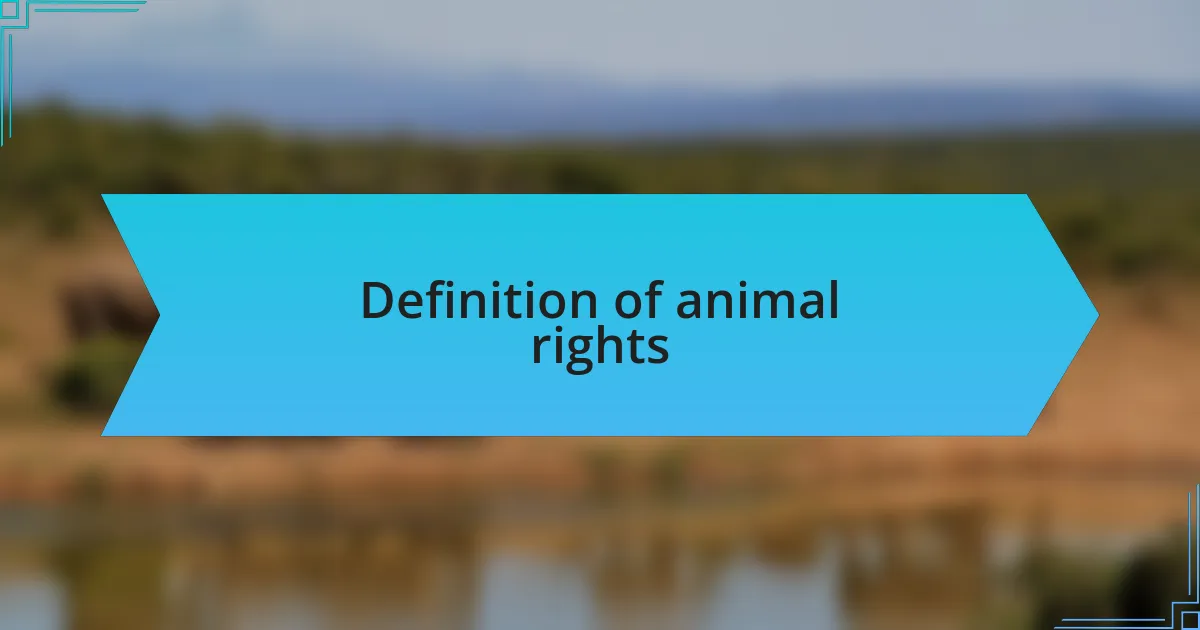
Definition of animal rights
Animal rights refer to the belief that all living beings deserve certain moral and legal protections, which includes freedom from suffering and exploitation. This concept challenges the traditional view of animals as mere resources for human use, leading us to consider their intrinsic value. Isn’t it fascinating how, just like us, animals experience pain, joy, and companionship?
I vividly recall a moment during an animal rights workshop where a participant shared a story about rescuing a stray dog. The transformation in that animal was heartwarming; it underscored the idea that every creature, regardless of its past, deserves compassion and respect. In that space, we collectively grappled with the moral implications of our choices—are we truly honoring the lives of animals, or are we turning a blind eye to their plight?
At its core, the definition of animal rights calls upon us to recognize the interconnectedness of all life forms. It’s a reminder that our ethical responsibilities extend beyond ourselves. Have you ever wondered how your own beliefs about animals shape your actions? This reflection can lead to profound changes in how we interact with and advocate for our fellow beings.
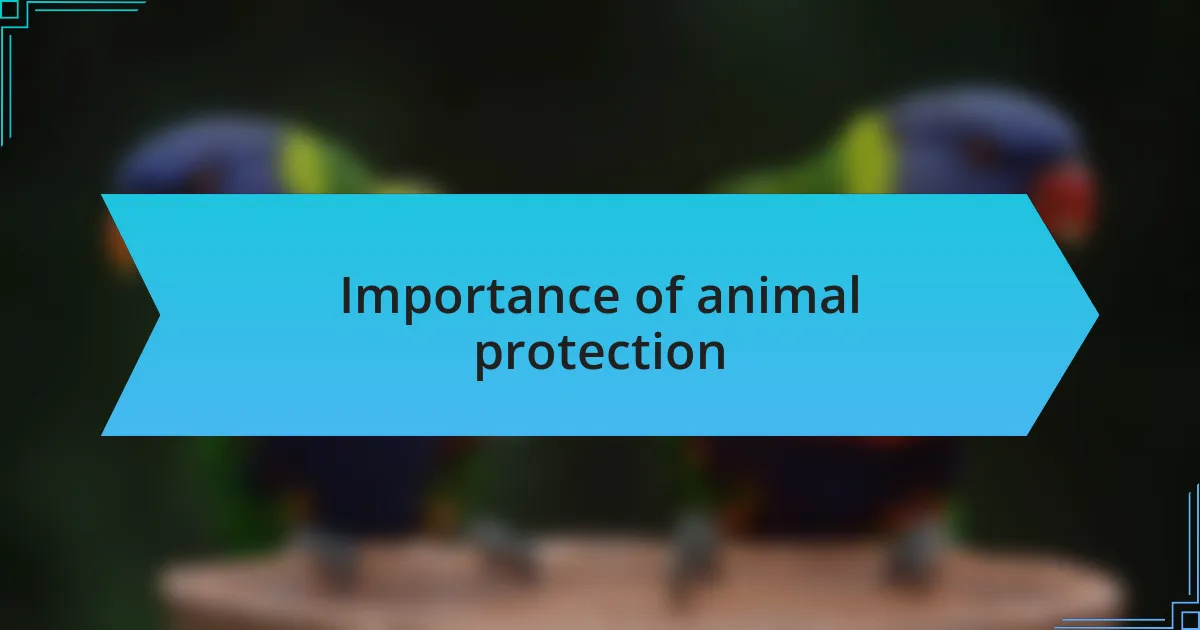
Importance of animal protection
Animal protection is essential not only for the welfare of animals but also for the health of our environment. I remember volunteering at a local shelter where I witnessed firsthand how protecting animals contributes to biodiversity. Each creature plays a role in its ecosystem, and losing even one species can disrupt the balance of life, affecting us all. Have you ever considered how your daily choices impact the animals around you?
Moreover, advocating for animal rights challenges us to reflect on our societies’ values. During a community outreach event, I spoke with a teenager who was passionate about animal protection but felt powerless. Our conversation reminded me that empowerment is key. By educating others about animal rights, we can foster communities that not only care about animals but actively fight for their protection. How can we inspire each other to take action?
Lastly, investing in animal protection has far-reaching social implications. I often think about the lessons of empathy and compassion that we miss when we ignore the plight of animals. When we teach future generations the importance of animal rights, we’re not just safeguarding other species; we’re cultivating a more humane society. Isn’t it crucial that we pass on these values?
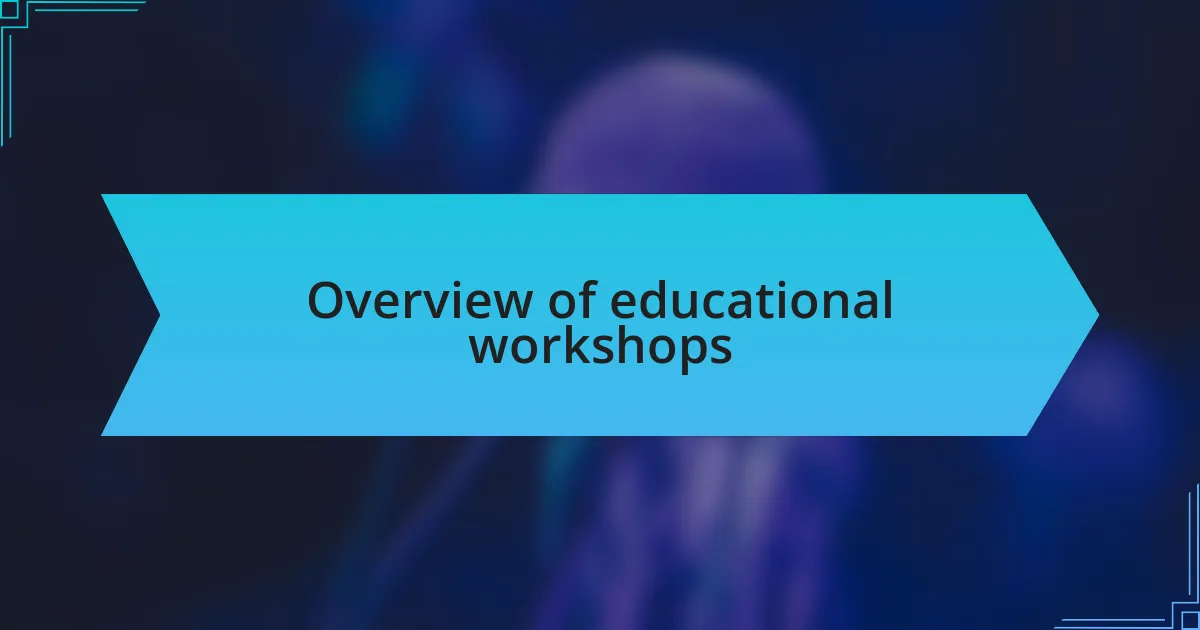
Overview of educational workshops
Educational workshops play a vital role in raising awareness about animal rights and protection. I recall attending a workshop where participants learned about the impacts of urbanization on local wildlife. The discussions ignited a passion within me, highlighting how knowledge can empower individuals to make informed decisions for the benefit of animals and their habitats.
These workshops not only provide crucial information but also encourage active participation and dialogue. I remember a session where we broke into small groups to brainstorm advocacy strategies. It was inspiring to see everyone’s unique perspectives and experiences come together, and it made me realize that fostering these discussions can ignite a movement for change. How often do we get the chance to share our thoughts on issues that move us deeply?
Moreover, the emotional connection fostered in these settings can transform abstract concepts into personal missions. I once shared my experiences rescuing stray animals during a workshop, and the response from attendees was overwhelming. People began to share their own stories, creating a bond that transcended the space. Isn’t it remarkable how sharing our experiences can deepen our commitment to animal rights?
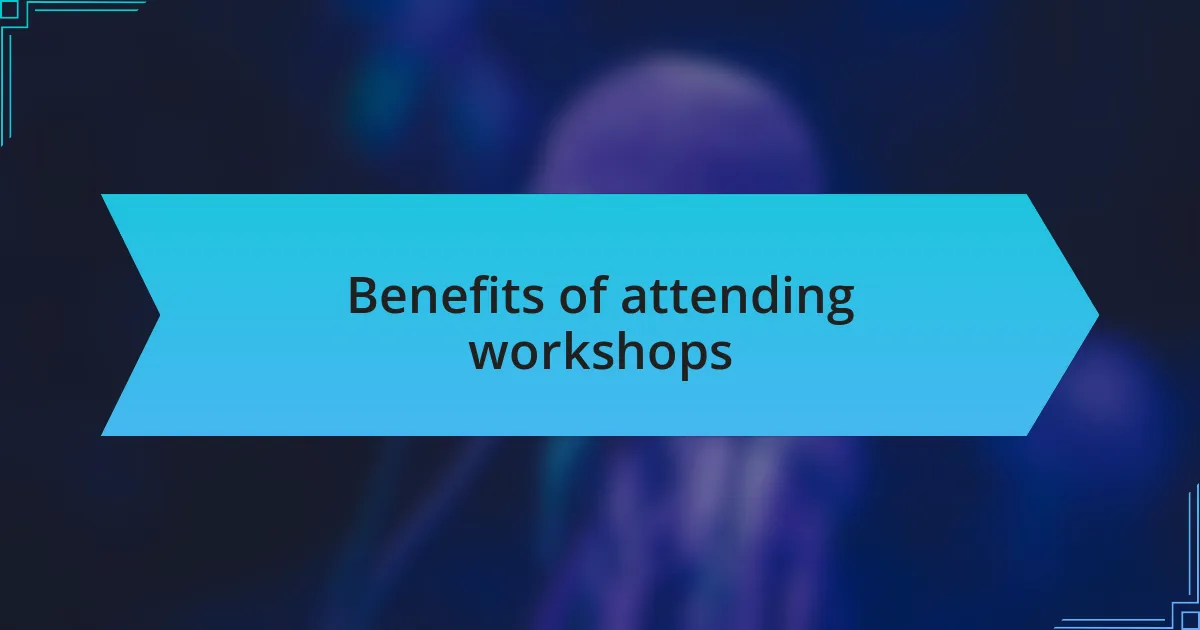
Benefits of attending workshops
Participating in workshops can significantly enhance your understanding of animal rights and the challenges they face. I remember attending a session where we explored the ethical implications of factory farming. The statistics were shocking, but what truly struck me was how enlightened participants became after engaging with this information. Have you ever left a discussion feeling like a weight had been lifted off your shoulders? That’s exactly how I felt—a newfound sense of responsibility to advocate for change.
Another remarkable benefit of these workshops is the networking opportunities they provide. At one event, I met individuals who later became collaborators in a local advocacy project. Sharing ideas and resources with like-minded people not only builds community but also strengthens our collective voice. It makes me wonder: how often do we let fear of reaching out hinder our potential for meaningful connections?
Lastly, the practical skills gained from hands-on activities during these workshops are invaluable. I recall a segment focused on creating compelling social media campaigns for animal rights awareness. The tools and insights shared were game-changers for me, allowing me to utilize social media effectively. Have you ever felt that rush of inspiration after learning a new skill? It’s this empowerment that drives us to take action, reinforcing the importance of continuing education in our advocacy journeys.
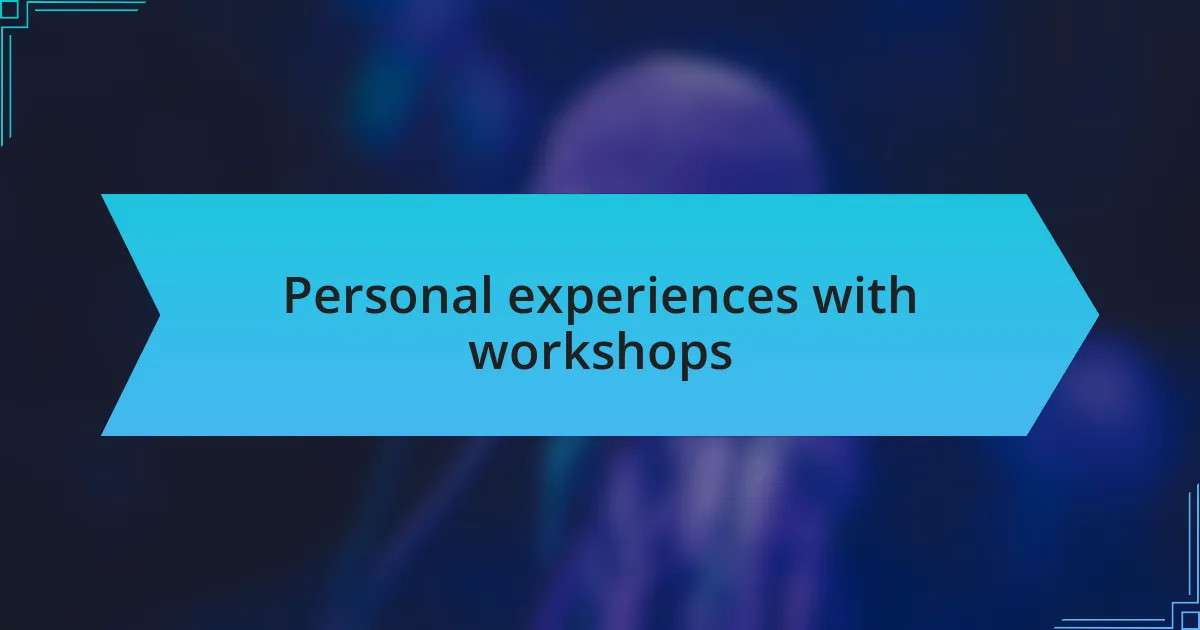
Personal experiences with workshops
Attending animal rights workshops has been a transformative experience for me. I vividly recall one workshop where we engaged in role-playing exercises that illustrated the perspectives of various stakeholders in animal welfare. It was eye-opening to step into the shoes of those who often oppose our views, helping me understand their motivations better. Have you ever felt that jolt of empathy, even for those with whom you disagree? It’s a powerful reminder that effective advocacy often starts with understanding.
Another workshop I attended focused on animal legislation, and I was surprised by how empowering it felt to dissect legal texts and understand the nuances. By the end of that day, I found myself not just more informed but inspired to write letters to local lawmakers. This newfound confidence made me wonder: what could happen if more of us took the time to understand the legal landscape of animal rights? Each small effort can contribute to significant change when we’re armed with knowledge.
One particularly memorable moment was during a discussion about rescue operations in our community. Participants shared gut-wrenching stories of animals they had saved, and I couldn’t help but feel the passion in the room. After hearing those firsthand accounts, I was moved to volunteer at a local shelter. I often reflect on how a single workshop can ignite a spark of action; it challenges us to step up and make a tangible difference in the lives of animals.
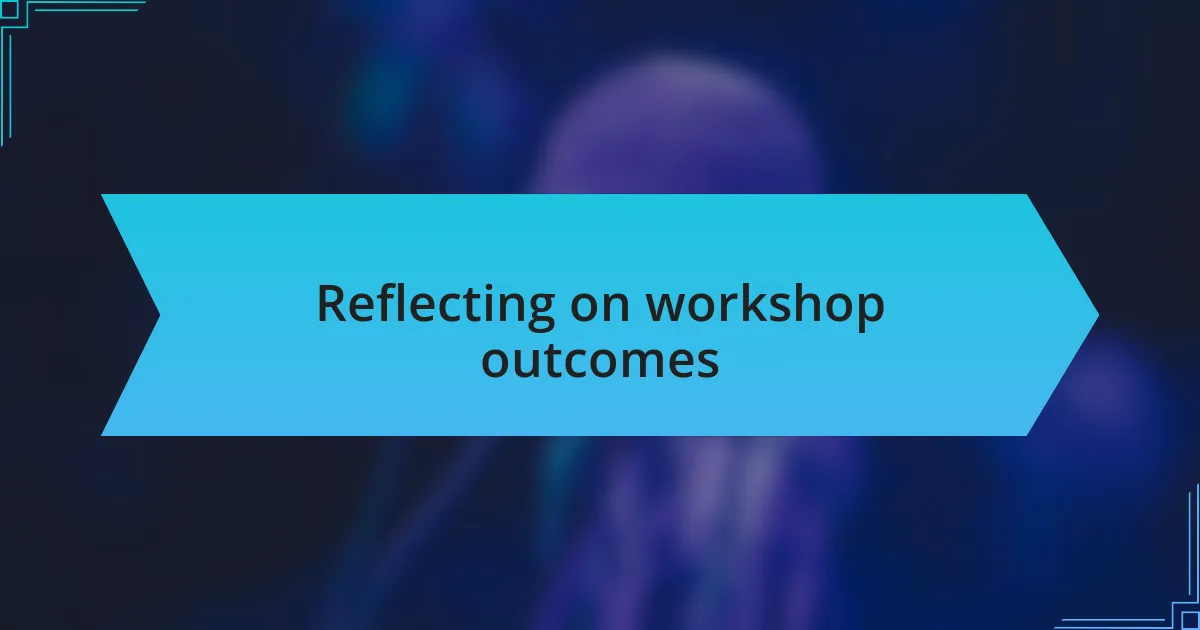
Reflecting on workshop outcomes
Reflecting on the outcomes of these workshops often highlights the unexpected connections formed between participants. During one session, we split into small groups to brainstorm ideas for animal advocacy campaigns. I was pleasantly surprised by the diversity of ideas that surfaced, each one reflecting unique backgrounds and experiences. Isn’t it fascinating how collaboration can ignite creativity? I left that workshop energized, feeling that our collective efforts could amplify our voices in ways we hadn’t imagined.
In another workshop, a simple reflection exercise struck me profoundly. We were asked to write a letter to our future selves about what we hoped to achieve for animal rights within a year. As I penned my thoughts, I realized how much my goals had shifted—from simply supporting the cause to actively becoming a leader in my community. This exercise was more than just introspection; it became a commitment to progress. Can a few moments of self-reflection truly reshape our aspirations?
Looking back, I often think about how these workshops have reinforced the idea that education is a catalyst for change. I remember a participant who had never considered volunteering before, but by the end of the workshop, their perspective had transformed. They were not only ready to volunteer but also eager to share their learning with others. This ripple effect is what makes the outcomes of these workshops so rewarding; they empower individuals to take action and inspire those around them. How can we harness this momentum to create a broader change in society?
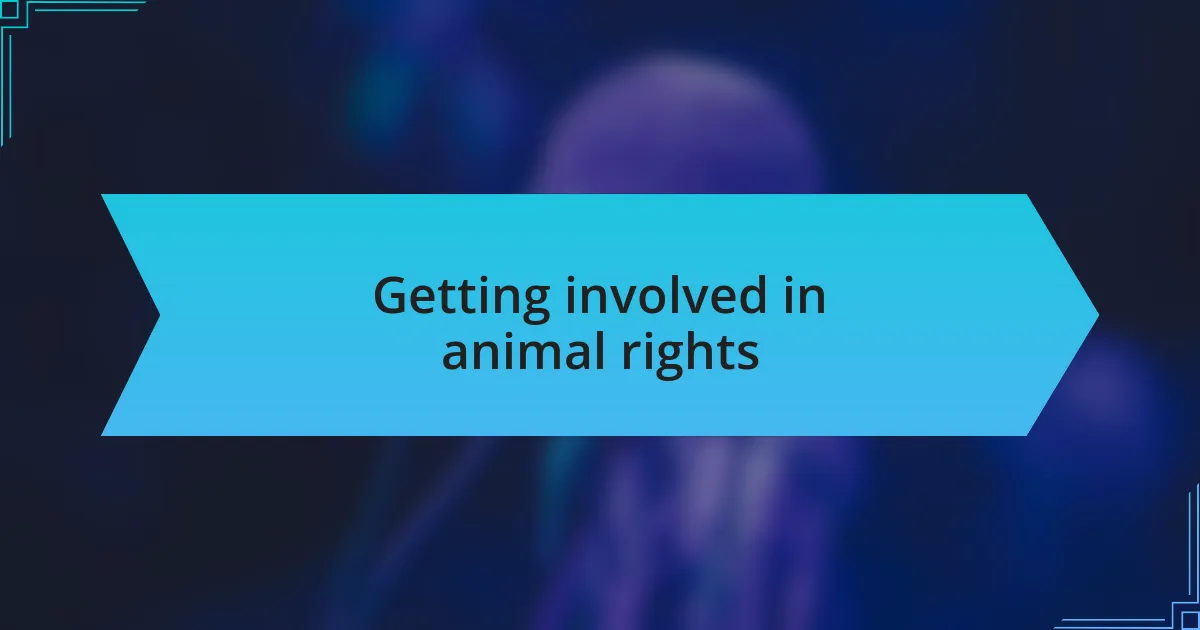
Getting involved in animal rights
Getting involved in animal rights can start with small, intentional actions. I remember my first experience volunteering at a local animal shelter. Initially, I felt nervous and out of my element, but as I helped care for the animals and interacted with fellow volunteers, that anxiety faded. Isn’t it remarkable how taking that first step can lead to a profound sense of belonging?
Joining a community group focused on animal rights often opens doors to new opportunities for advocacy. I once attended a rally organized by such a group, and I found myself inspired by the passionate speeches and the collective determination of the crowd. The energy was infectious, turning my initial uncertainty about speaking out into a powerful desire to be an active voice for those who cannot speak for themselves. How can we harness that passion and use it to educate others?
Donating time, resources, or even sharing knowledge can significantly impact the animal rights movement. I found that hosting a small educational workshop in my neighborhood not only informed others about animal welfare issues but also sparked meaningful conversations around responsible pet ownership. When we share our experiences, don’t we create a stronger community for change? Engaging with others not only amplifies our advocacy efforts, but it can transform our personal journey into a collective mission.